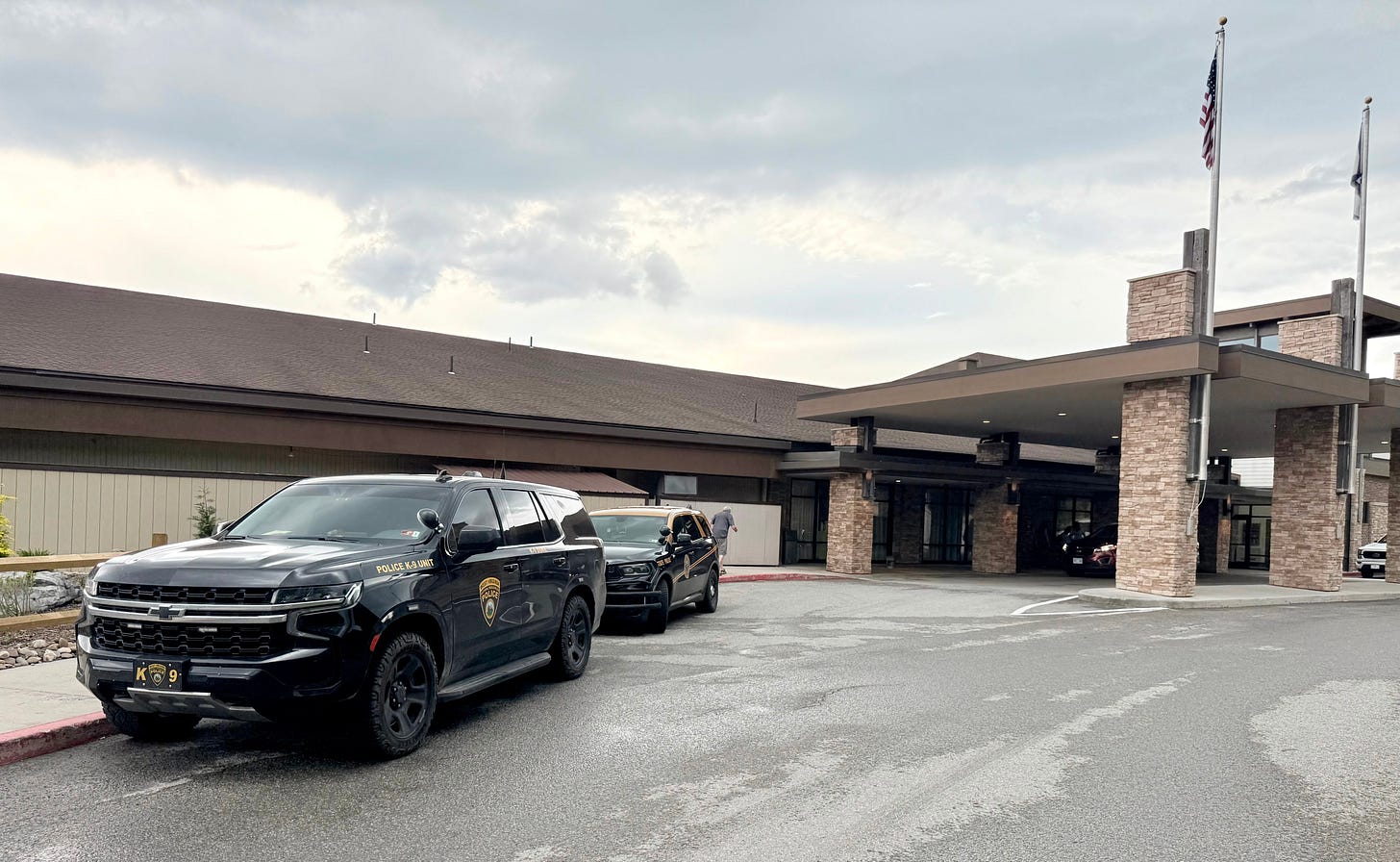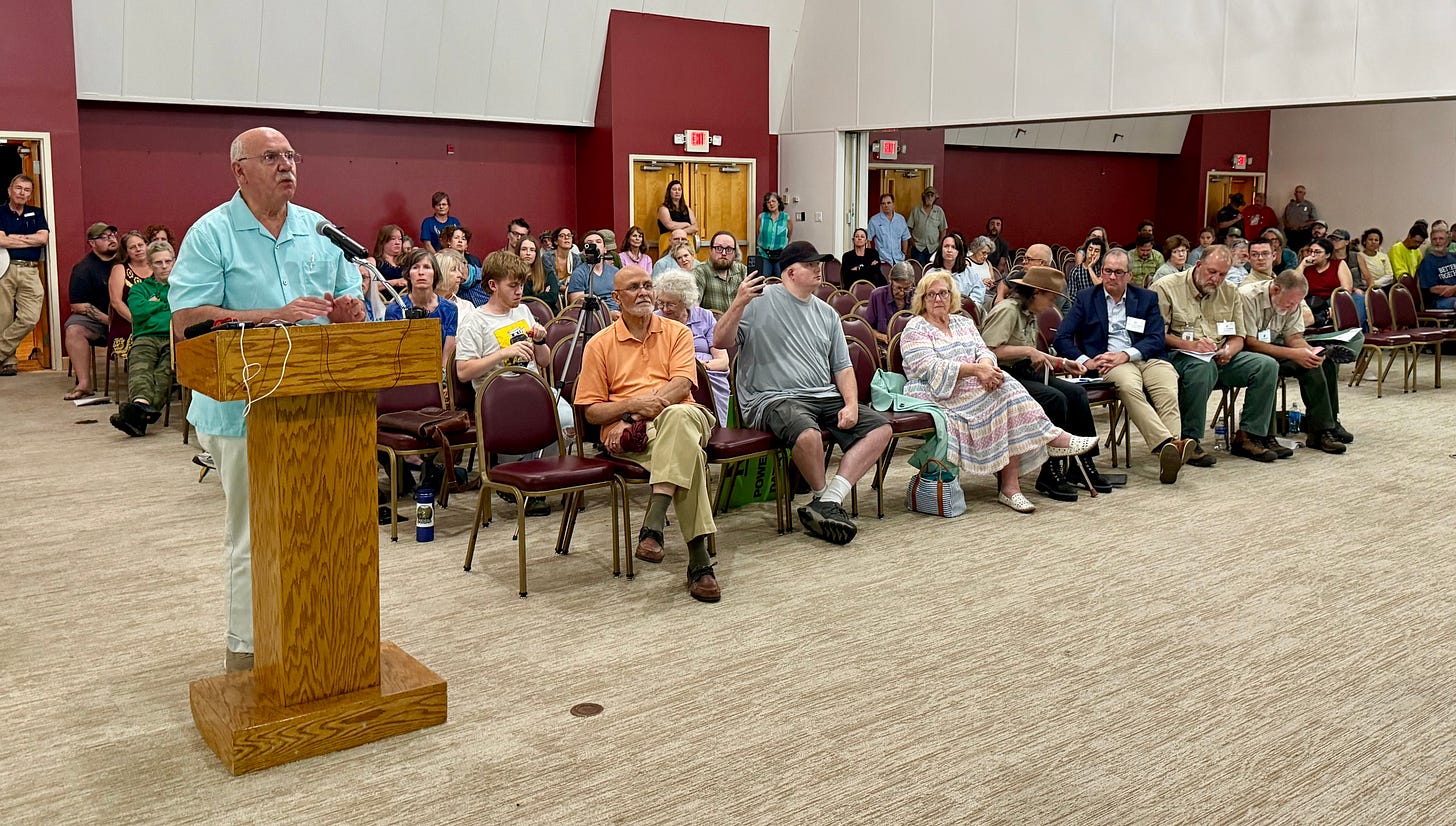State Officials Appear Almost Certain to Approve Power Plant Air Permit
Residents say environmental regulators are putting corporate wishes ahead of public health
West Virginia air quality regulators appear almost certain to approve a permit for a controversial power plant near Davis and Thomas despite strong opposition from many local residents.
“I don’t think the impacts are going to be large and substantive from this facility,” said Joe Kessler, program manager in the state Division of Air Quality.
He added later in the meeting, “we’re confident, very confident, that this is a properly designed and crafted draft permit.”
The comments came at a public hearing on the proposed facility held by officials with the air quality division of the West Virginia Department of Environmental Protection (DEP). About 325 people attending the hearing at Canaan Valley Resort State Park, which was scheduled for three hours but lasted five hours.
Dozens of people spoke against the power plant or raised concerns about the impact it would have on the area. No one spoke in favor of the facility.
State Police officers were on hand, but the meeting occurred without incident.
At several points during the meeting, Kessler sought to calm worries about the impact of the power plant on the area. He said he doesn’t expect the facility to produce visible amounts of pollution.
“I don’t feel like visual impacts will necessarily be an issue at all from a facility like this,” Kessler said. When asked later in the meeting whether he’d send his child to a school a mile away from the proposed power plant, he replied, “absolutely.”
Applicants typically seek a permit for the worst-case scenario, and “the actual emissions are often much less” than the amounts cited in the permit application, Kessler said.
Although the purpose of the proposed off-the-grid power plant has not been officially disclosed, Kessler acknowledged that it likely would be used to provide electricity for data centers.
Helping companies comply
The DEP processes 300 to 400 air quality permit applications of various types annually, and typically none of them are denied, Kessler said. The reason for the high approval rate, Kessler explained, is that state regulators help companies correct problems with their permit applications and guide them toward approval.
“Our job is not to deny permits based on what comes in. Our job is to give feedback to companies, let them know what’s wrong,” Kessler said.
About 75 percent of air quality permit applications would be denied based on what is initially submitted, Kessler said. Regulators work with applicants to make the adjustments to their plans and documents necessary to bring them into compliance, Kessler said.
Many speakers at the event pleaded with state regulators to instead help opponents of the facility block its construction. “What will it take to shut them down?” said one speaker, drawing cheers from the audience but no direct response from state officials.
“Why do we have regulations?”
In one of the sharpest exchanges of the evening, power plant opponent Amy Margolies asked state air quality engineer Jerry Williams, “Why do we have regulations? You tell me, you’re the regulator.”
Williams struggled to formulate a technical reply, saying, “you have national air quality standards, and those were based on science….” Margolies interrupted him and said slowly, emphasizing each word, “The reason is to protect the public.” The exchange drew an eruption of cheers and applause from the audience.
Margolies said the proposed facility is unusual because of its large size, proximity to a school, and other factors. She said the power plant would be the fourth largest in West Virginia and the 27th largest in the nation. No existing power plant in the nation that produces more than 1,500 megawatts of electricity is located within two miles of a town, she said.
Passing the buck?
State air quality officials said repeatedly that their role under state law is narrowly targeted at air quality issues, and they have no oversight over issues like water usage and discharge, traffic, site selection, or tourism impacts.
“We do not have the authority or even the metrics to look at those types of issues when we’re reviewing a permit,” Kessler said. “We just don’t have the authority to do that.”
Williams encouraged people with concerns about water usage, tourism, truck traffic, and other issues to contact local elected officials about those concerns. However, the Tucker County Commission, which has local authority over the proposed site of the power plant, has encouraged opponents of the facility to direct their concerns to state officials.
“Spineless governor”
Davis Mayor Al Tomson, an outspoken opponent of the proposed power plant, sharpened his attacks directed at Patrick Morrisey, who has sought to make the state a magnet for data centers.
Morrisey championed a “microgrid” law enacted earlier this year that stripped local governments of the ability to block or regulate data centers in their jurisdictions. Tomson has previously challenged Morrisey to meet with him for “a man-to-man conversation about this issue,” and on Monday Tomson referred to Morrisey as a “self-serving, spineless governor.”
Tomson and other speakers worried that once the power plant is approved, the state will do little to ensure that it complies with pollution limits.
“We run a sewer plant in Davis. The DEP inspects our sewer plant more frequently than it sounds like you’re going to inspect the power plant,” Tomson said.
Other concerns
Additional issues raised by audience members include:
Distrust of the plant operator’s expertise and long-term plans. Audience members complained that Fundamental Data, the secretive Virginia company that applied for the permit to build the power plant, has no track record of building power plants or data centers. Opponents also said Fundamental Data is being deceptive about its intentions. State regulators replied that those concerns are not a basis for denying an air quality permit.
“Major” versus “minor” pollution source. Fundamental Data is seeking approval for the power plant as a “synthetic minor source” of emissions, which faces much lower regulatory hurdles than a “major” source of pollution. Critics of the power plant say it is designed to burn far more fuel and generate far more pollution than allowable under a minor source designation. Critics also said it’s suspicious that Fundamental Data’s permit application cites pollution levels that are barely below the threshold for a “minor” emitter. State officials replied that it’s not unusual for applicants to seek the maximum operating capacity allowed under the terms of a permit.
Air inversions. Opponents of the power plant said that regulators were not considering the unusual geological characteristics of Canaan Valley, which experiences frequent air inversions that would trap air pollution from the power plant in the valley. The state officials acknowledged that air inversion characteristics of a region typically are not part of their permit review process.
What’s next
The DEP will hold a virtual meeting from 6 to 8 p.m. July 17 to accept additional comments on the proposed power plant. The public also may submit comments by mail or email.
The comment period closes at 5 p.m. July 18. State regulators then have 90 days to issue a decision on the permit, Kessler said. However, regulators are allowed to extend that deadline if they need more time to evaluate the permit.
Terry Fletcher, a spokesman with the DEP, said other permits in addition to the air quality permit may be required for the power plant to begin operations. For example, the facility may need storm water runoff permits, he said. “That will depend on their operations and what they propose to do,” Fletcher said.
He added, “other permits may be needed from other state agencies. We can’t really speak to what possible permits may be out there.”








Western Pocahontas needs to come forth with their reasons for allowing this to happen on their land, so close to towns, schools, and senior centers. They'll remain our neighbors for many years to come and better to get along. The DEP, local politicians, as well as other State agencies will likely not slow this project down. Perhaps the shell companies have a soul and conscience? Hopefully the investors that are backing these data centers love their community and called to action when things are going wrong. Looking for ideas on where to turn, besides feeling frustrated about how unfair this is. Our comments and disapproval are falling on deaf ears. Build these things where they're welcomed and it may be simply a few miles up the road.
Don't worry the environmentally conscious landowner has your back, “These are huge pieces of property, and we know it’s a lot to absorb,” said Roy Bechtol, president of a land planning firm hired by Western Pocahontas Properties. “But you’ve got to start somewhere.” Bechtol’s firm specializes in “environmentally conscious resort and master planned communities,” especially golfing communities, according to its website. The Data Center Golf Links will be beautiful, and the State of West Virginia Division of Environmental Protection will be there to protect everyone from all the traffic, air, light, noise and water pollution. Heck they will allow only one and a half tons of formaldehyde a year to be sprayed on Davis and Thomas and the elementary school. The State has such a great record of environmental protection. /sarc